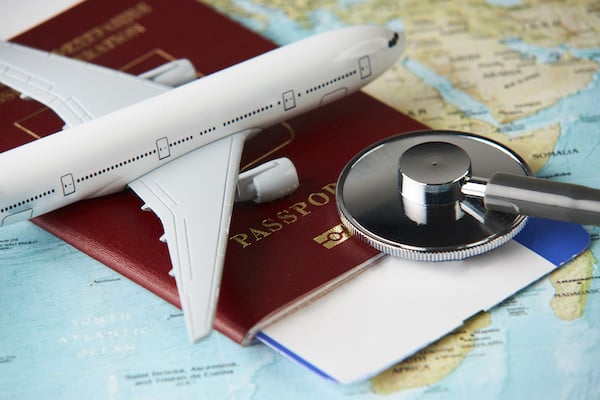Travel Insurance: Essential Protection for Journeys. Traveling is an exciting and enriching experience, but it comes with uncertainties such as flight cancellations, medical emergencies, lost luggage, and trip interruptions. Travel insurance serves as a safeguard, providing financial protection and assistance when things go wrong during your trip. This article explores the importance of travel insurance, its types, benefits, and key factors to consider when purchasing a policy.

1. What Is Travel Insurance?
Travel insurance is a policy designed to cover unforeseen expenses and risks while traveling. It helps travelers recover costs associated with medical emergencies, trip cancellations, lost baggage, and other travel-related mishaps.
2. Importance of Travel Insurance
Many travelers overlook the significance of travel insurance, assuming their health insurance or credit card protections are sufficient. However, travel insurance offers comprehensive coverage for a variety of risks, ensuring peace of mind and financial security.
2.1 Medical Emergencies Abroad
Healthcare expenses in foreign countries can be exorbitant. Travel insurance provides coverage for medical treatments, hospital stays, and emergency medical evacuations if needed.
2.2 Trip Cancellations and Interruptions
Unexpected events such as illness, natural disasters, or personal emergencies can lead to trip cancellations. Travel insurance reimburses non-refundable expenses, preventing financial loss.
2.3 Lost, Stolen, or Delayed Baggage
Luggage mishaps can disrupt your trip. Travel insurance covers lost, stolen, or delayed baggage, allowing you to replace essential items without additional financial burden.
2.4 Flight Delays and Cancellations
Airline disruptions due to bad weather or technical issues can lead to additional expenses. Travel insurance covers costs related to accommodation, food, and alternative travel arrangements.
2.5 Emergency Assistance Services
Most travel insurance policies provide 24/7 assistance, helping travelers find medical care, replace lost passports, or arrange emergency evacuations.
3. Types of Travel Insurance Coverage
Travel insurance policies come in different types, tailored to different travel needs and risks. Understanding these types helps travelers choose the right coverage for their trips.
3.1 Medical Travel Insurance
This policy covers medical expenses incurred during a trip, including hospitalization, doctor consultations, and emergency evacuations.
3.2 Trip Cancellation and Interruption Insurance
This coverage reimburses non-refundable travel costs if the trip is canceled or interrupted due to covered reasons such as illness, injury, or unforeseen emergencies.

3.3 Baggage and Personal Belongings Insurance
If your luggage is lost, stolen, or delayed, this policy helps you recover the cost of personal belongings and essential items.
3.4 Emergency Evacuation and Repatriation Insurance
In case of serious illness or injury requiring transportation to a better-equipped medical facility, this policy covers evacuation costs and, if necessary, repatriation.
3.5 Accidental Death and Dismemberment Insurance
If a traveler suffers a fatal accident or permanent disability while traveling, this policy provides compensation to the insured or their beneficiaries.
3.6 Rental Car Insurance
For travelers renting a car, this policy covers damages or theft of the rental vehicle, reducing out-of-pocket expenses.
4. Benefits of Travel Insurance
Purchasing travel insurance offers numerous benefits, providing peace of mind and financial protection during trips.
4.1 Financial Protection
Travel insurance helps recover costs from unexpected disruptions, ensuring that travelers don’t face financial burdens due to unforeseen circumstances.
4.2 Coverage for Pre-Existing Medical Conditions
Some travel insurance plans offer coverage for pre-existing medical conditions, allowing travelers with health concerns to travel with confidence.
4.3 Assistance in Medical Emergencies
In case of illness or injury, travel insurance ensures access to quality medical care and covers the associated expenses.
4.4 Support for Lost or Stolen Documents
Losing important documents such as passports and visas can be distressing. Travel insurance providers offer assistance in obtaining replacements quickly.
4.5 Stress-Free Travel Experience
Knowing that you are protected against financial losses and emergencies allows for a more relaxed and enjoyable travel experience.
5. Factors That Affect Travel Insurance Premiums
The cost of travel insurance varies based on several factors. Understanding these elements helps travelers find an affordable policy that meets their needs.
5.1 Destination of Travel
Countries with high healthcare costs or security risks tend to have higher insurance premiums due to increased liability.
5.2 Duration of the Trip
Longer trips have higher premiums, as the risk of encountering travel disruptions increases over time.
5.3 Age of the Traveler
Older travelers typically pay higher premiums due to an increased risk of medical emergencies.
5.4 Type of Coverage and Policy Limits
Comprehensive policies with higher coverage limits result in higher premiums, while basic coverage plans cost less.
5.5 Pre-Existing Medical Conditions
Some insurers charge higher premiums or exclude coverage for pre-existing medical conditions, requiring travelers to purchase additional coverage if needed.

6. How to Choose the Right Travel Insurance Policy
Selecting the right travel insurance policy involves assessing your travel needs and comparing available options. Here are key considerations:
6.1 Evaluate Your Travel Risks
Identify potential risks associated with your destination, activities, and personal health to choose appropriate coverage.
6.2 Compare Multiple Insurance Providers
Research and compare policies from different insurers to find the best balance of coverage and cost.
6.3 Read Policy Exclusions
Carefully review what is not covered by the policy, such as extreme sports or high-risk destinations, to avoid surprises.
6.4 Consider Add-On Coverage
If needed, purchase additional coverage for activities like adventure sports, business equipment, or rental cars.
6.5 Check the Insurer’s Reputation
Choose a reputable insurance provider with good customer reviews and a history of fair claims processing.
7. Conclusion
Travel insurance is a crucial aspect of travel planning, providing financial protection against trip cancellations, medical emergencies, lost belongings, and other travel mishaps. It ensures that travelers can navigate unexpected situations with ease and minimal financial impact.
Understanding the types of travel insurance, its benefits, and the factors affecting premiums enables travelers to make informed decisions. Investing in a comprehensive travel insurance policy allows for a stress-free and enjoyable travel experience, ensuring safety and financial security throughout the journey.
